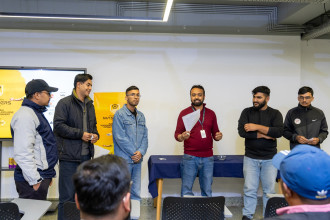KATHMANDU: The ‘Justice Summit 2025’ concluded in Kathmandu, emphasising the need to ensure effective legal implementation to end caste-based discrimination and untouchability.
Organised jointly by Dalit Lives Matter Global Alliance (DLMGA) and Global Legal Defence Fund on the occasion of Law Day, the summit witnessed the participation of legal professionals, law students, journalists and civil society representatives from all seven provinces.
During the programme, three working papers were presented on topics such as the constitution, federalism, inclusion, Dalit women and justice and cross-caste solidarity. Commenting on these papers, legal experts, political party leaders and representatives of civil society stressed that all mechanisms of the state must become serious and accountable to end caste-based discrimination.
In the closing ceremony of the programme, Chief Guest Minister for Law, Justice and Parliamentary Affairs Ajay Kumar Chaurasia mentioned that the government is serious about the issues related to the Dalit community. “The government has taken policy and legal commitments to end untouchability and caste-based discrimination,” he said.
The ceremony was also attended by Chairperson of National Dalit Commission Devraj Bishwokarma, Chairperson of National Women Commission Kamala Kumari Parajuli, Acting Chairperson of Madheshi Commission, Nepal Jivachha Sah, Member of the National Human Rights Commission-Nepal Ramesh Dhungel, Attorney General Ramesh Badal and Senior Superintendent of Police (SSP) Ranju Sigdel. Dignity Defender Babita Mahara recited the conceptual proposal of the summit.
Member of the House of Representatives (HoR) Santosh Pariyar commented that although the constitution has ensured the rights of the Dalit community, the implementation aspect remains weak. “The state still does not seem serious about the issues of Dalits. We will continue to fight until this discrimination ends,” he said. Similarly, lawmaker Sita Mijhar emphasised the need for special programmes at the federal, provincial and local levels targeting the Dalit community, stating that the weakness in implementation has created problems.
Despite being the first edition of the Justice Summit, the organising institutions have announced their commitment to continue it in the coming years. Founding Chairperson of DLMGA Pradip Pariyar expressed his commitment to engaging in meaningful dialogue and creative initiatives to end the structural discrimination, injustice and violence against the Dalit and marginalised communities.
Article 24 of the Constitution guarantees the right against untouchability and discrimination, Article 40 guarantees the rights of Dalits and Article 42 guarantees the right to social justice. The Caste-based Discrimination and Untouchability (Offence and Punishment) Act, 2068 (2011 AD) considers caste-based discrimination and untouchability to be serious criminal offences. This Act provides for punishing perpetrators with imprisonment and fines, as well as providing justice to victims with compensation.
Similarly, the Procedure for the Elimination of Caste-based Discrimination and Untouchability and Promotion of Dalit Rights, 2073 (2016 AD) is in implementation, under which there is a provision for the formation of a high-level central committee under the coordination of the Prime Minister, a coordination committee under the coordination of the Chief Secretary and district-level committees under the coordination of the Chief District Officer.
The Government of Nepal has already institutionalised the National Dalit Commission as a constitutionally established body. However, incidents of citizens losing their lives due to caste have not yet ceased. The failure to end caste-based violence is a tragic matter. Women, Dalits and especially Madheshi Dalit women have become victims of triple oppression. Similarly, individuals from sexual and gender minority communities are facing even greater complexities. The suspicious deaths of Rinku Sada and Anandi Devi Sadaya have been presented as recent examples of such caste-based violence.
In cases of caste-based violence, the role of the three major state bodies – Nepal Police, the Office of the Government Attorney and the court – appears decisive in whether victims receive justice. Therefore, these bodies need to become more sensitive and responsible in ensuring effective implementation and compliance with established laws. Additionally, it is equally important for people’s representatives to enact necessary new laws in accordance with the constitutional, legal and policy arrangements to protect the rights and interests of the Dalit and marginalised communities, and to ensure their strict implementation.






